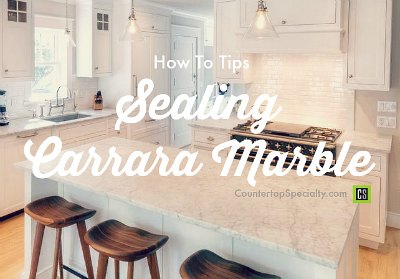Sealing Carrara Marble
QUESTION:
What is the best sealer for Carrara marble kitchen countertops, bathroom vanity and for shower tile?ANSWER:
You have a couple issues to consider prior to sealing Carrara marble or any natural stone which are discussed below. But getting to the point....The top two sealers I recommend are this Permanent Stain-Proof or this Impregnating sealer.
The Permanent Stain-Proof sealer uses the most advanced sealer technology available creating permanent bonds with the stone requiring only one application. Extremely durable. Excellent product.
But there's more to the story....
First Step to Sealing Carrara Marble
The first rule of sealing stone is... never blindly apply a sealer.
But all marble must be sealed, right?
Hmmmm... Well, I know the internet told you so... but want to know a little sealing secret? .... that's BANANAS!
That's right... you may not have to apply a sealer.
The first step is to perform the sealer test to determine if you even need to seal your Carrara marble.
The neat trick to this test is that it works even if you don't know a thing about the type of stone, name, color, or surface finish. It will tell you if you need to apply a stone sealer... or not.
Stains, Etching & Sealing
When, where, and how to seal Carrara marble or any marble is a continuous point of confusion for consumers.
At fault is the myth of marble stains.
Marble is not super-absorbent despite what you commonly read that it "stains easily" and needs sealing. That's not true and polished marble can be virtually non-absorbent and stain-proof without sealing.
A honed marble finish usually does need sealing.
The misunderstanding on this point stems from the assumption that every spot is a stain. False.
I untangle the myth of marble stains with a detailed discussion on our marble vs. granite page that will make this issue crystal clear for you and every marble owner must learn about diagnosing marble spots, but here's the short-n-sweet version...
A true marble stain is from some substance absorbing into the marble creating a dark spot. Carrara marble (or any marble) does not "stain" easily.
However, it does "etch" easily. This is a completely different animal, but the two get lumped together resulting in the myth that marble stains easily.
Etch marks are dull spots from acidic or chemical corrosion. Since an etch mark is clear or whitish in color it is often called a "water stain" fueling the myth.
It is not caused by water, nothing has absorbed into
Etching is physical damage to the marble. It's like a burn. Marble polishing is required to repair an etch mark, but it's a simple DIY process using the Etch Remover / Marble Polisher product.
To help avoid etching only use products safe for marble maintenance and minimize contact with acidic foods, drinks and personal products.
And one last piece of the puzzle... sealing will not prevent marble etching.
Pardon me?
Yes, sealers help prevent absorption and staining, but cannot stop the physical surface damage that occurs with etching.
Tips on Sealing Carrara Marble
Polishing marble (creating the shiny finish at the factory) closes down the pores making the marble less absorbent than it naturally is. This is true for travertine too.
Polished marble doesn't readily absorb liquids and often does not need sealing. In fact, the sealer itself may not absorb.
Of course, this is good.
Honed marble is a bit more absorbent than when the marble has a polished finish and will more likely take a sealer.
Note the above are not hard-n-fast rules. Rather they are guidelines to help you gain a better understanding of sealing Carrara marble.
You still need to perform the water test to determine if your specific (and totally unique) marble slab or tile installation needs sealing or not. But now that you know the real story, you won't be surprised if your marble doesn't need sealing.
Sealing a kitchen countertop or bathroom vanity or floor tile are all basically the same operation. The same sealer can be used and applied in the same way.
Showers are a special breed with additional considerations though...
Sealing a marble shower typically isn't necessary since the risk of staining is very low. The one exception is when sealing a white marble shower like Carrara marble.
It's a must to wait 3 weeks post-install before you apply the marble sealer (if testing shows the shower could be sealed).
Waiting a few weeks allows all moisture to evaporate from the newly installed tile and grout. Otherwise, you'll trap it in the tile. No bueno.
This is true for any natural stone installed on a wall or floor.
Sealing a marble countertop can be done immediately since the underside is exposed and any moisture will still evaporate from the stone.
So, first, test all surfaces to determine if you need to apply a sealer or not. If so, then apply the Permanent Marble & Granite Sealer and you'll be good to go.
photo credit
Return to Cleaning Marble Questions & Answers.




